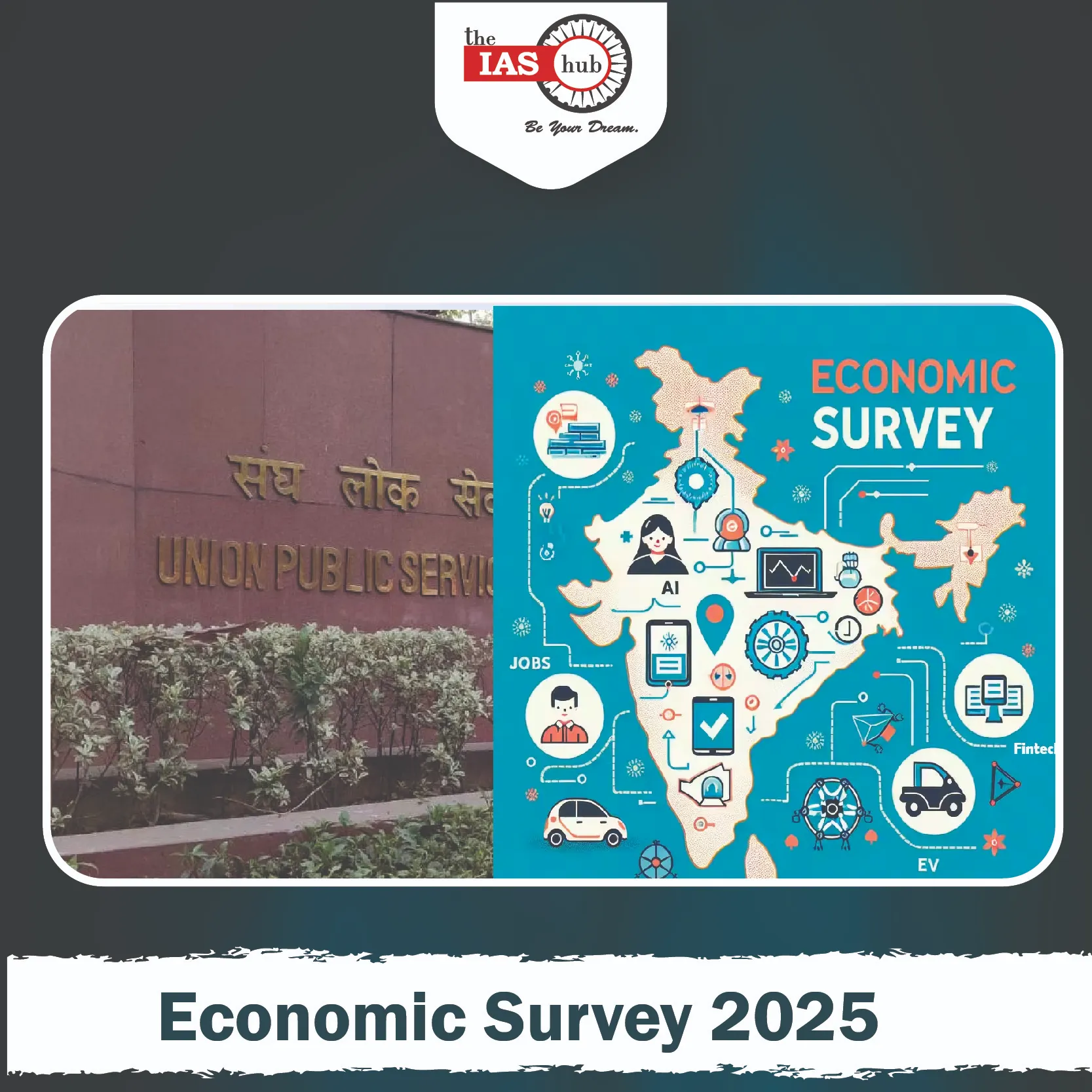Economic Survey 2025 analyzes India's economic trends, growth projections, and policy insights, serving as a key guide for policymakers, economists, and UPSC aspirants.


The Economic Survey 2025 is a crucial document that analyzes India’s economic progress and sets the foundation for policy decisions. Released ahead of the Union Budget, it provides insights into growth trends, fiscal health, and sectoral developments. Understanding this report is essential for economists, policymakers, and UPSC aspirants.
The Economic Survey is an annual government document that reviews the country’s economic performance over the past year. It is prepared by the Chief Economic Adviser (CEA) and presented by the Finance Minister in Parliament. The report offers policy recommendations to drive economic growth and stability.
The Economic Survey 2025 was presented on January 31, 2025, a day before the Union Budget. This timing allows policymakers and analysts to review the economic trajectory before finalizing budget allocations. The document is presented in both houses of Parliament and later made available to the public.
The Economic Survey 2025 highlights India’s projected GDP growth, investment trends, financial market risks, and regulatory reforms. It serves as a precursor to the Union Budget, helping shape fiscal policies.
Click here to download Economy Survey PDF 2025.
The Finance Minister of India presents the Economic Survey in Parliament. However, it is drafted under the supervision of the Chief Economic Adviser (CEA). In 2025, V. Anantha Nageswaran played a key role in its preparation.
The Economic Survey 2025 provides an in-depth analysis of various sectors, fiscal performance, and macroeconomic trends. Key areas covered include:
The Economic Survey 2025 key points include:
The Economic Survey covers a wide range of topics related to the economy. It includes:
| Indicator | Details |
| Gross Tax Revenue Growth | Increased by 10.7% YoY (April-November 2024) |
| Tax Devolution to States | Increased, leaving lower net revenue with the Union |
| Fiscal Deficit | Indicators remain stable, allowing room for capital spending |
| Capital Expenditure Growth | Focus on infrastructure; major spending in defense, railways, and transport |
| State Revenue Expenditure | Grew by 12% YoY, with subsidies increasing by 25.7% |
| Public Sector Borrowing | Managed to control government dissavings, contributing to macro stability |
| External Sector Stability | Services trade surplus and remittances helped maintain a stable current account deficit (1.2% of GDP) |
The first Economic Survey was released in 1950-51. Initially, it was part of the Union Budget documents but became a standalone publication in 1964. Since then, it has evolved into a detailed analysis that informs economic policymaking.
The Economic Survey and the Union Budget are closely linked. While the survey reviews the past year’s economic performance, the budget outlines financial plans for the upcoming fiscal year. Policymakers use the survey’s insights to allocate resources effectively and set realistic economic targets.
For instance, if the survey highlights slow industrial growth, the budget may introduce incentives for manufacturing. Similarly, if the survey signals inflation concerns, the government may adjust taxation and spending policies accordingly.
For UPSC aspirants, the Economic Survey 2025 is a key resource. It provides factual data and analytical insights necessary for answering economics and current affairs questions. Understanding economic indicators, fiscal trends, and policy recommendations enhances an aspirant’s grasp of governance and public administration.
The Economic Survey 2025 serves as an essential guide to India’s economic health, outlining growth forecasts, investment strategies, and regulatory reforms. Released just before the Union Budget, it helps shape the nation’s financial policies. Whether you are a policymaker, an economist, or a UPSC aspirant, this document is indispensable for understanding India’s economic direction.
The Finance Minister presents it in Parliament, while the Chief Economic Adviser prepares the document.
The first Economic Survey was released in 1950-51 and became a standalone document in 1964.
The survey reviews past economic performance, while the budget outlines financial plans based on its insights.
It provides key economic data and analysis essential for economics and current affairs sections in the UPSC exam.


Refine your answer writing skills and elevate your UPSC preparation with personalized support and expert feedback.
Fill out the form to get started with the program or any other enquiries !








Are you dreaming of becoming an IAS officer? Then, IAShub can be your best guide. It is one of the Best IAS Coaching in Delhi. Many students who want to clear the UPSC exam join IAShub for learning. The institute gives both online and offline classes. Their teachers are experienced and helpful. They easily explain every topic. Students also get notes, tests, and tips to do well in the exam.
IAShub is in Delhi and is trusted by many UPSC students. It offers coaching for every part of the UPSC exam – Prelims, Mains, and Interview. The classes are simple and easy to understand. The teachers are experts and guide students in the right way. IAShub is also known for its helpful notes, test series, and answer-writing practice. IAShub is the best coaching in Delhi and also gives UPSC Online Classes. This helps students from any place in India to learn. The online classes are live and also recorded. So, students can watch them anytime. These classes cover the full UPSC syllabus.
Here are some important services provided by IAShub:
The UPSC Civil Services Exam has three parts:
This exam is tough, but with the right guidance, it becomes easy to manage. Students must study smart and stay regular.
IAShub supports students from the beginning to the end. It gives the right books, tests, and notes. The classes are easy to follow, and the teachers are always ready to help. Students get personal doubt sessions too. The test series and answer checking help students learn where they need to do better. Also, free study materials save time and money.
IAShub also guides students during the final stage – the interview. Experts take mock interviews and give useful tips. This full support makes IAShub one of the best IAS coaching in Delhi.
